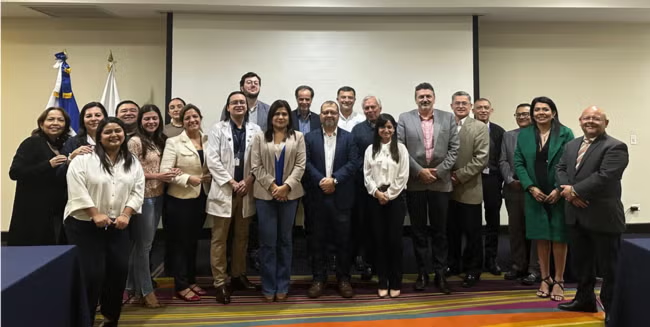Washington, D.C., October 17, 2025 – To strengthen interinstitutional coordination and advance the implementation of El Salvador’s primary health care (PHC) model, the Pan American Health Organization (PAHO), the World Bank (WB), and the Inter-American Development Bank (IDB) supported the Ministry of Health of El Salvador (MINSAL) in convening a technical workshop on October 16-17. The event was held as part of the activities of the Mesa Consultiva of the Alliance for Primary Health Care in the Americas (AxPHC).
The workshop brought together technical teams from MINSAL and representatives of the three international agencies to align ongoing cooperation initiatives, identify synergies, and define a joint roadmap to drive the transformation of El Salvador’s health system based on the PHC approach.
In line with the Ministry’s strategic vision, the workshop sought to establish technical, operational, and institutional agreements among the participating agencies to ensure coordinated action in key areas such as primary health care, integrated health service delivery networks, digital health, and health workforce development.
The event was led by Carlos Alvarenga, Vice Minister of Health Management and Development at MINSAL, and attended by Gianluca Cafagna, Senior Health Specialist for the Health, Nutrition and Population Global Practice (WB); Ignacio Astorga, Lead Health Specialist in the Health, Nutrition and Population Division (IDB); Marcelo Korc, PAHO/WHO Representative in El Salvador; Ernesto Báscolo, Chief of the Primary Health Care and Integrated Service Delivery Unit (PAHO/WHO); and Benjamín Puertas, Chief of the Human Resources for Health Unit (PAHO/WHO); along with national technical teams and representatives of the cooperating agencies.
The Alliance for Primary Health Care in the Americas
Launched in December 2023 by PAHO, the IDB, and the World Bank, the Alliance for Primary Health Care in the Americas promotes investments, innovation, and policies to strengthen PHC as the cornerstone of resilient, equitable, and sustainable health systems.
El Salvador formalized its participation in the Alliance in December 2024 through the creation of the Mesa Consultiva for Primary Health Care, a national governance mechanism that facilitates coordination of investment, technical cooperation, and financing among MINSAL, PAHO, the IDB, and the World Bank. The Mesa serves as a platform for political and technical dialogue aimed at strengthening the Ministry of Health’s stewardship role and advancing the transformation of the national health system toward integrated, equitable, and people-centered services.
Since its launch, several countries in the Region, including Chile, El Salvador, Panama, Paraguay, and the Dominican Republic, have established national Mesas Consultivas as instruments for coordination and joint action under the Alliance.
Images are for reference only.Images and contents gathered automatic from google or 3rd party sources.All rights on the images and contents are with their legal original owners.

